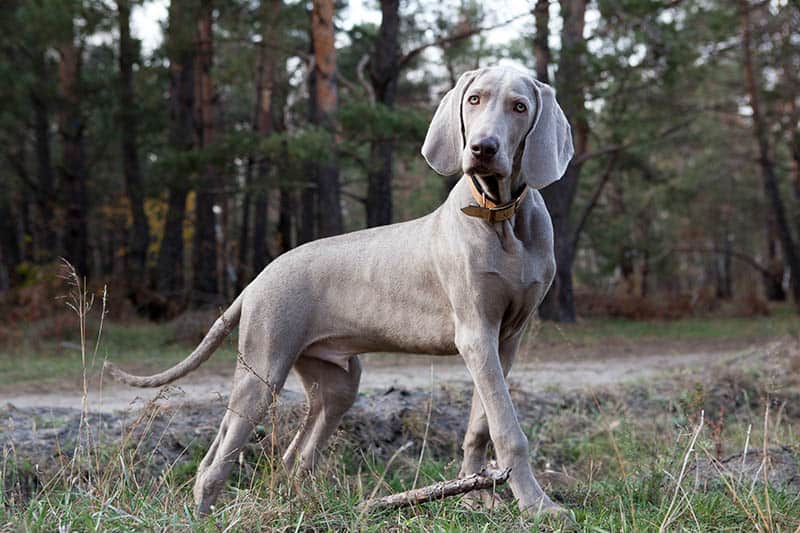
The sleek muscular Weimaraner is full of energy, it makes a rambunctious, yet affectionate pet!
The Weimaraner has a strong hunting instinct, and skilled gun dog. Also called the Grey Ghost or Gray Ghosts, it was bred in the late 1700’s throught the early 1800’s, originally for royalty to hunt large game animals like deer and bear. Then later on it was used for smaller animals like rabbits and foxes.
The Weimaraner can make a loyal and brave pet with proper socialization. They are protective of their families, making them good guard dogs. This breed is very active, and makes a great companion for an active and attentive person. When choosing a Weimaraner, check for hip or elbow dysplasia, thyroid and growth disorders, and bleeding disorders.
- Kingdom: Animalia
- Phylum: Chordata
- Class: Mammalia
- Order: Carnivora
- Family: Canidae
- Genus: Canis
- Species: lupus familiaris
Common Name(s)
Weimaraner, Grey Ghost, Gray Ghost, Weim, Weimar Pointer, Weimaraner Vorstehhund
Breed Type
Weimaraners are a sporting breed. Used to hunt a variety of game, they were favorites of royalty in the nineteenth century.
Background
The Weimaraner has been around for centuries. There is much debate about its ancestry, but the breed is believed to have originated in Europe. Breed standards were developed in the 1800s.
There is a rare long-haired variety of the Weimaraner, but it is not recognized by North American kennel clubs. Popular hybrids include the Weimardoodle (Weimaraner and Poodle mix) and the Labmaraner (Labrador Retriever and Weimaraner mix).
Description
The Short-Haired Weimaraner is a slender yet muscular dog with a sleek, fine gray coat. The head and ears are slightly lighter in color. The ears are long, and they eyes are gray, bluish-gray, or amber. The breed has webbed feet and a docked tail. Males are 24-27 inches in height and weigh 55-70 pounds. Females are 22-25 inches tall and weigh 50-65 pounds.
Care and Feeding
Weimaraners need a diet high in animal fat. The diet should include poultry, lamb, potato, and grains. This breed is very prone to bloat, so it is advisable to feed two or three small meals each day.
The Weimaraner’s coat requires little care. Regular brushing and occasional dry shampooing are all that is necessary. It is important to keep an eye on the dog’s feet and mouth, and to keep its nails trimmed. It is standard procedure to dock the short-haired Weimaraner’s tail to 1 �½ inches at two days of age. Dewclaws are also removed during puppyhood.
Weimaraners need yearly checkups to stay healthy. Vaccinations are due on the following schedule:
- 6-8 weeks: Distemper, Leptospirosis, Hepatitis, Parainfluenza, Parvo, and Corona virus (DHLPPC)
- 10-12 weeks: Second DHLPPC
- 14-16 weeks: Third DHLPPC and rabies
- Annually: DHLPPC and rabies booster
Weimaraners shed moderately, so regular vacuuming is a must if they are to be kept inside.
Housing Your Dog
Weimaraners can live indoors in small spaces, but only if they get plenty of exercise. They do best with a large yard.
Social Behaviors
Weimaraners are affectionate with their families. They tolerate children fairly well, but may be too rambunctious for small children. They may be aggressive with other dogs, and should not be trusted with small pets.
Handling and Training
This breed should be trained with a firm but gentle hand. They are very sensitive to any form of physical punishment and are nearly impossible to train if they are afraid of their trainers. Weimaraners may be slow to housebreak.
Activities
The Weimaraner needs plenty of exercise. Daily walks and jogs are imperative, and they need a chance to run off-leash as often as possible. They should not be exercised after meals.
Breeding/Reproduction
Weimaraners are a fairly healthy breed, but they do sometimes inherit health problems. When selecting a mate for your dog, check bloodlines for joint dysplasia, Von Willebrand’s disease, thyroid and growth disorders, and kidney problems.
Common Health Problems
Bloat is one of the biggest concerns with Weims. It is important to feed and exercise them properly to avoid this. Thyroid and kidney problems are also somewhat common, and must be treated by a veterinarian.
Availability
Weimaraners may be hard to find in some areas, but breeders can be found with ease online. Prices are usually in the $400 to $800 range.
References
“Weimaraner“, Wikipedia, Copyright 2008
“Weimaraner“, Dog Breed Info Center, Copyright 1998-2008
Cusick, William D., “What to Feed a Weimaraner“, Referenced online, 2008
Welton, Michelle, “Weimaraners: What’s Good About ‘Em? What’s Bad About ‘Em?“, Copyright 2000-2008
“Weimaraner Puppies for Sale“, Copyright PuppyFind.com, LLC, Referenced online, 2008
Featured Image Credit: Dmitry Veryovkin, Shutterstock
